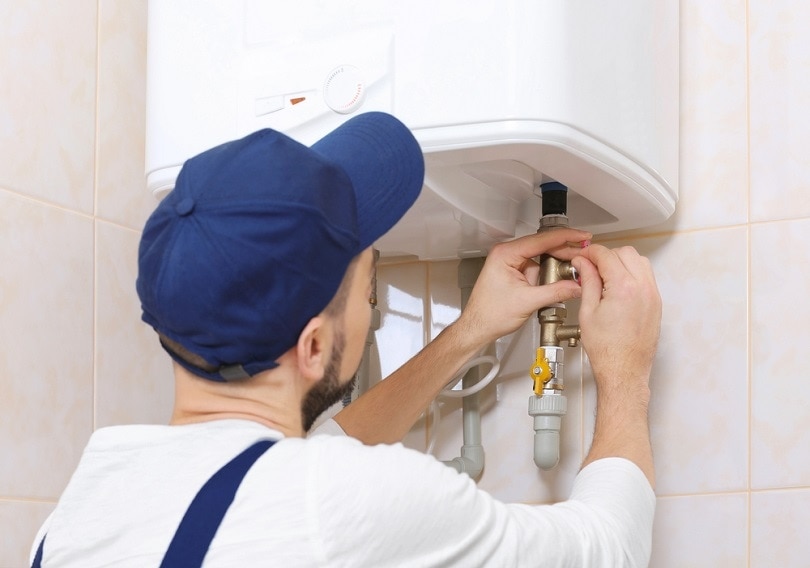Tankless vs Tank Storage Water Heaters: The Differences and How You Can Save Money
-
Pete Ortiz
- Last updated:

Did you know that water heating makes up more than a quarter of the average American household’s energy usage?1 Next to the cooling and heating system of your home, your water heater is likely the appliance that costs the most to operate.
Being informed about your choices for the right water heater for your home can save you money, storage space, and time waiting for the water to heat back up. That’s why we decided to do this in-depth, but concise exploration of storage tank vs tankless water heaters.
In this article, we’ll tell you a little bit about each type of water heater to get you familiarized with their functions, as well as give you the cut-and-dry comparisons. Folks who already know a bit about water heaters, or those who just want the no-frills version can skip right down to pros and cons.
How Tank Storage Water Heaters Work
In both homes and commercial properties, the most used water heaters are tank-style heaters.
Powered by electricity, propane, natural gas, or oil, storage 6 Best Water Heater Blankets this year — Reviews & Top Picks all function in a similar way: the unit heats a large storage tank of water (usually between 20-80 gallons), and continually reheats it. When hot water is drawn from the unit, it is siphoned from the top, and cold water replenishes the tank from the bottom.
Tank storage water heaters, like the Agust Mini-Tank, are uncomplicated, and all plumbers and repairmen are familiar with them due to their prevalence of use. They are popular in part because old habits die hard, but also because of their reliability and easy maintenance.
Efficiency
When the stored water temperature drops below a certain temperature, the unit automatically reheats it. That means regardless of how much water you are using, a tank-style water heater is constantly working to keep water hot.
Though well-insulated storage tanks can cut out some inefficiency, these units are bound to waste some energy reheating water over and over throughout the day.
Performance
If you have a big family and a tank-style heater, chances are you’ve run out of hot water once or twice. Because even though 50 gallons sounds like a lot, an American family of four has been clocked at using an average of 65 gallons of hot water per day!
So, as you can guess, the main complaint about storage tank water heaters is that they are slow to reheat once all the hot water has been used. However, if your unit is properly sized to meet your water demands you shouldn’t have any trouble.
Price and Installation
On the upside, installation of a tank-style heater is usually simple – and therefore affordable. Even if you are switching fuel types or changing the size, the cost of installation will be about the same as the unit itself (generally $300-$500).
How Tankless Water Heaters Work
Tankless water heaters have been popular in Asia and Europe for many years and recently caught on for whole-house water heating in the United States.
As opposed to the constant reheating of the tank-style, these units (like the EcoSmart ECO11) heat water on demand. Cool water comes in one side of the tankless unit and exits out the other side a few seconds later, fully heated and ready to use. This super-fast heating process is achieved by electric heating coils or a gas burner.
Efficiency
The clever, speedy water heating technology in tankless units makes them dramatically more energy-efficient than the tank storage variety – as much as 30%! And the less energy you use, the more money you save over time.
Depending on your water usage, the average American household can save over $100 a year with a gas-powered tankless heater and over $40 per year with an electric.
Performance
With a tankless water heater, when you turn on the faucet there is no delay; fully heated water is available immediately. On average, tankless heaters deliver 2-3 gallons of hot water per minute.
The on-demand design means that you will never “run out” of hot water, but excessive use can limit the output. For example, hoping in the shower while the dishwasher is running may be a chillier experience than you wanted!
Tankless units also typically last longer than tank storage heaters. Their lifespan is typically 20-30 years – double that of the traditional tank-style.
Price and Installation
However, all that comes at a price. Tankless water heaters are often double or triple the price of tank-style, ranging from $600-$1,200, and switching between the two types can be similarly expensive.
Once you have a tankless heater installed though, the longevity and energy savings can start to recoup the initial investment.
Pros and Cons: Tankless Water Heaters vs Tank Storage Water Heaters
Now that you know a little about how each type of water heater works, we can get into the nitty-gritty – concise and bite-sized pros and cons.
- Likely lower unit cost and installation fee
- Simpler operation, less costly maintenance and repairs
- Widely used, no specialist needed
- Utility bills are slightly higher, especially if poorly insulated
- Wastes energy, not very eco-friendly
- Limited storage capacity and lengthy reheating time
- Physically large, takes up a lot of space
- Shorter lifespan, 10-15 years
- Hot water on demand, no delay
- Significantly more energy efficient than tank-style
- Lowers utility bill over time
- Rarely needs replacing, 20-30 years lifespan
- Takes up little space, can go almost anywhere
- Higher initial cost of unit and installation
- Cannot keep up with multiple, high output sources
- Yearly maintenance recommended
Final Thoughts
So, which water heater is right for you? That depends on your water usage, utilities and appliances budget, and concerns about energy efficiency.
For a bigger family that needs a consistent output, perhaps a tankless water heater would work best. Never be penalized for being the last one to shower again and save money on utilities all at once!
Maybe you don’t need a large amount of hot water throughout the day or don’t have the money to make a pricier, long-term investment right now. In that case, the less expensive and reliable tank storage water heater will do just fine.
We hope that this analysis of tank vs tankless water heaters has helped you get a better understanding of your home appliances. Armed with the right water heater know-how you can increase your home’s efficiency, spend less on utilities, and ensure you always get the perfect water temperature for any task.
Featured Image Credit: Africa Studio, Shutterstock
Contents






